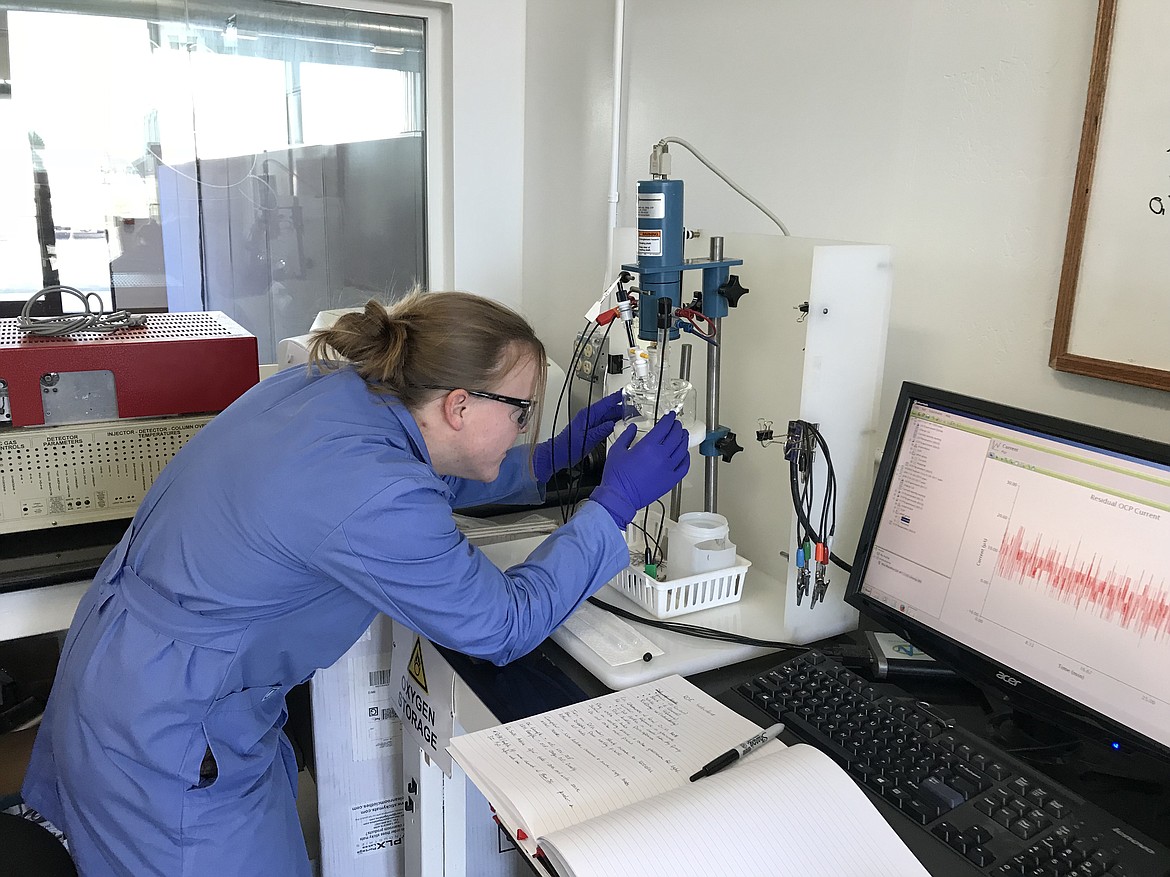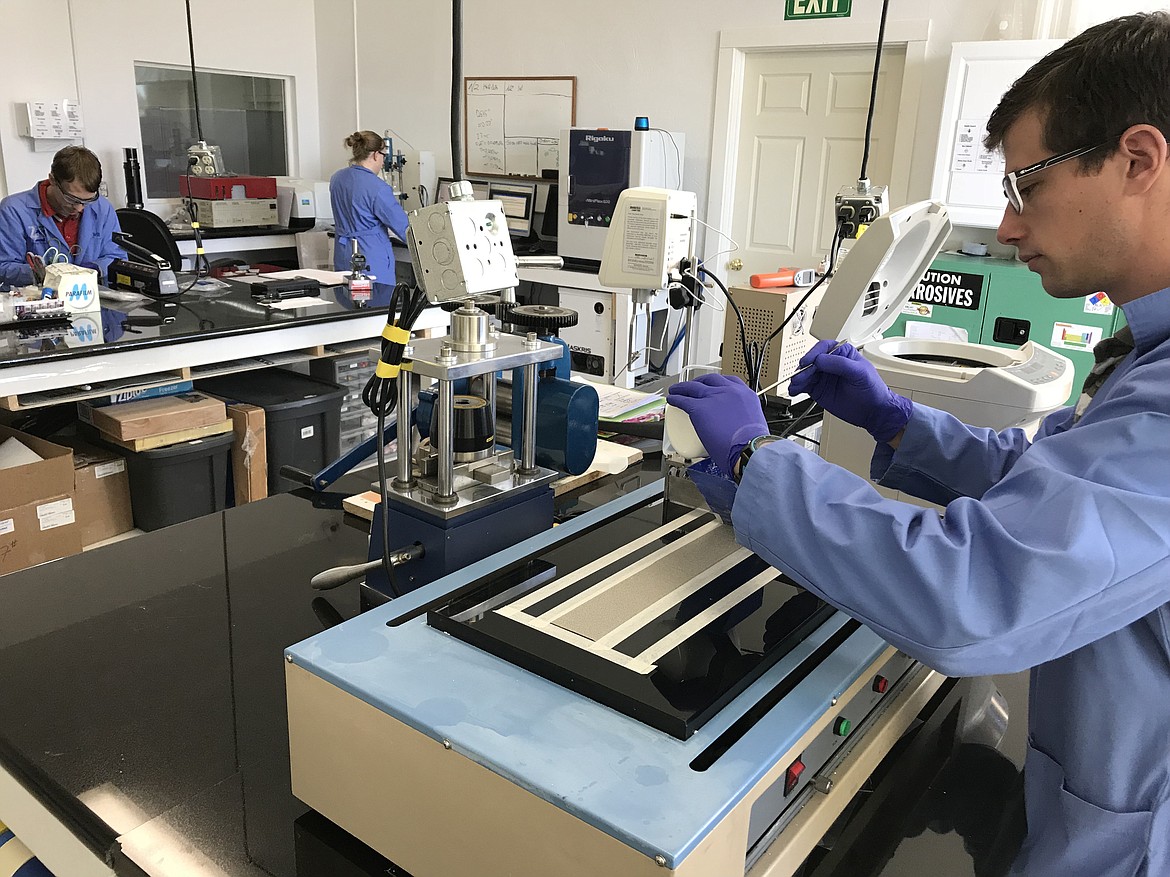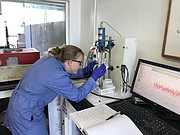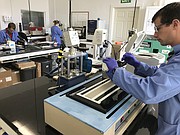ZAF Energy poised for takeoff in battery technology
Like many good business stories, this one starts in a garage.
Back in 2008, somewhere in the foothills of the Swan Range between Bigfork and Columbia Falls, cousins Craig and Dave Wilkins began a start-up in their uncle’s garage that sought to extend the life of lithium batteries used to power cellphones and lap-tops.
Since then, several iterations of different products and offshoot businesses studying different technologies have been created. They include ViZn Energy, a local company also founded by the Wilkins cousins, and spin-off Zinc Air Fuel Cells Inc. The name of the second company was changed to ZAF Energy Systems Inc. in 2013, and is on the cusp of disrupting the market share of some of the biggest battery manufacturers in the country.
They’re doing a significant portion of their business from a research-and-development center off U.S. 2 in Columbia Falls. The company has raised about $7 million locally and $10 million total for its operations. It has about 15 employees at the local facility, though that could balloon to over 50 if everything goes according to plan in the next year.
“This area here, I would say there is as much expertise here around the battery technology side of this as there is in Silicon Valley, using our types of chemistries,” said Craig Wilkins, executive vice-president and co-founder of ZAF Energy Systems.
The company now focuses on developing larger batteries used in commercial trucking, boats and large data centers, among other things.
They now expect the company to disrupt the battery market using innovations to Nickel-Zinc technologies, which they hope will displace more common lead acid or lithium ion batteries because they have some big advantages.
Namely, they can release a lot more power at once, last longer and are much easier to recycle and reuse in future batteries. They are more economical, their use leads to a lot lighter loads for shipping and boating operations and are a lot more environmentally friendly.
Wilkins noted an example of how the batteries can be a game-changer in the long-haul trucking industry.
In recent years, the federal government has instituted regulations requiring truckers to pull over and rest for 10 out of every 24 hours they are on the road. They also aren’t allowed to have the engine idling, which can lead to a big demand for 10 hours of electricity, especially with all the electrical demands of the modern technology used in the off-time.
“Kind of what’s happened in the trucking industry is the power loads have grown dramatically from 10 years ago even,” Wilkins said. “Now, there are these sleeper comfort systems, so when that guy is sitting in his sleeper area he has his air-conditioning going, he has his TV going, telematics, they’ve got all this new electronic gear they are putting into these trucks, but unfortunately there is only a certain amount of space that can fit to put batteries into it.”
Using the batteries ZAF Energy is developing, a truck that currently carries 10 heavy lead-acid batteries will only need five nickel-zinc batteries, saving space and weight that are valuable commodities in an industry driven by carrying things from place to place.
Similarly, Wilkins said, the Environmental Protection Agency has instituted regulations requiring ships to turn off their engines as they get near coastal areas, so they tend to switch on electric motors when they get close to shore. That requires a lot of battery power, and on long voyages these batteries have to be carried everywhere. The new technology will have the same impact as on the trucking industry, freeing up space and weight to load on more cargo or other gear.
Wilkins also espouses the environmental benefits of the technology. While lithium-ion batteries can be recycled, Wilkins said the materials often degrade to the point that they can’t again be used in batteries. The materials used in the batteries ZAF is designing will be able to be recycled into material again that can be used to make more batteries, and any given task only takes half as many batteries in the first place.
Another big advantage over other battery materials is the large global supply of zinc and nickel.
“They are globally abundant, so we don’t get into a position where we have geopolitical forces restricting our supply of raw materials that go into the battery,” Wilkins said. “I wasn’t going to create a new OPEC by starting a zinc-battery company because you can buy zinc anywhere.”
Wilkins also pointed out that while a lot of nickel is produced in the politically precarious Philippines, it is also fairly widely available in other corners of the earth.
The technology has never become prominent in the industry before because it also has three big problems: dendrite formation, zinc migration and dry out. Wilkins believes ZAF Energy has solved all three issues.
The first problem, dendrite formation, can punch holes that cause short circuits in the battery. The second, zinc migration, doesn’t ruin batteries but only decreases their performance over time. They solved the dry out by creating a technology that captures the hydrogen and oxygen the battery emits charging and keeps it within the system.
Wilkins said his crew is working on perfecting their product and getting it in customers’ hands to show them how effective it is. To help do that, the company recently cut the ribbon on a brand new facility in Joplin, Missouri, that will help them manufacture on a small scale the prototypes they are designing in Columbia Falls.
He is then confident they can use their testimony to sign a licensing deal with a major manufacturer within the next year.
“We’ll have a licensing deal done in 2018. We should have multiple licensing deals in 2018,” Wilkins said. “We’re not going to ramp up to handle global demand through our own production.”
Those licensing deals are what will eventually cause the cash to flow into ZAF Energy. After some initial licensing fees, they will collect royalties on sales and use the research and development facility in Columbia Falls to continue to refine the product.
He said they have also been looking into opportunities to contract with the defense department, something new CEO Randy Moore has been especially helpful with. Moore recently joined the company after being president of EaglePicher Technologies LLC, a leading producer of lead-acid batteries. Wilkins said hiring Moore was a major coup that has everyone in the company feeling optimistic because it was an indication they had a good business model and a chance to really make waves in the industry.
“That battery alone, I can probably meet about $15 billion of the $50 billion lead-acid market, with one product,” Wilkins said. “You don’t do that, as big as EaglePicher was in the military’s face, they are a $200 million organization. That battery has the potential to disrupt a $50 billion industry, and you don’t get to do that very often.”
Wilkins said that even if all goes according to plan and they are able to cash in on their long years of work in the next 12 months, they have no plans to move research and development from the Flathead Valley.
“We are Montana guys,” he said.
Reporter Peregrine Frissell can be reached at (406) 758-4438 or pfrissell@dailyinterlake.com.






